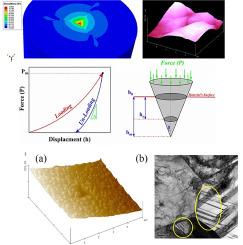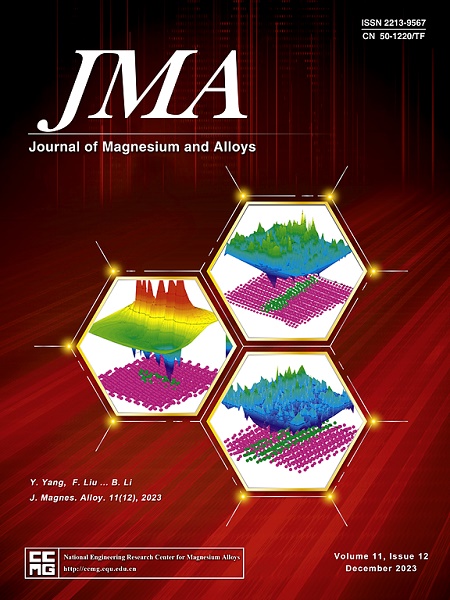Nanomechanics of Mg-Gd-Y-Nd-Zn alloy with LPSO and MgRE phases
IF 15.8
1区 材料科学
Q1 METALLURGY & METALLURGICAL ENGINEERING
引用次数: 0
Abstract
The mechanical properties of two main precipitating phases (LPSO and MgRE) and matrix in Mg-Gd-Y-Nd-Zn bioalloy were examined using nanoindentation method. A new is suggested for characterizing the elastic–plastic behavior, fracture toughness and strain rate sensitivity (SRS) of materials within micro/nanoscale. Firstly, a nanomechanical model was developed for extracting hardness (H), young's modulus (E) and yield stress (σY) from the characteristic load points which were subsequently analyzed by atomic force microscope (AFM) images. The elasticity data and AFM data were then utilized for determination of plastic deformation in constituent phases. The displacement of the indentation gets the highest value for Mg matrix and between precipitates, depth is more in LPSO rather than that of MgRE. The serrated flow or the behavior of shear bands may originate from the side effect of the interface region in Mg alloys with precipitates. It can be deduced that the KIC produced by both L method and energy-based calculation are both reliable for KIC approximation. The maximum load in simulation with µ=0.2 friction is marginally lesser than that of the frictionless (µ=0) one while elastic recovery of indentation with µ=0.2 is higher to some extent.

具有 LPSO 和 MgRE 相的 Mg-Gd-Y-Nd-Zn 合金的纳米力学特性
利用纳米压痕法研究了镁-锗-镍-锌生物合金中两种主要析出相(LPSO 和 MgRE)和基体的力学性能。为表征微米/纳米尺度材料的弹塑性行为、断裂韧性和应变速率敏感性(SRS)提出了一种新方法。首先,开发了一个纳米力学模型,用于从特征载荷点提取硬度(H)、青年模量(E)和屈服应力(σY),然后通过原子力显微镜(AFM)图像对其进行分析。然后利用弹性数据和原子力显微镜数据确定各组成相的塑性变形。镁基体和析出物之间的压痕位移值最大,LPSO 的压痕深度大于 MgRE。锯齿状流动或剪切带行为可能源于带有析出物的镁合金界面区的副作用。由此可以推断,L 法和基于能量的计算方法得出的 KIC 都是可靠的 KIC 近似值。摩擦力 µ=0.2 时的模拟最大载荷略小于无摩擦力(µ=0)时的最大载荷,而 µ=0.2 时的压痕弹性恢复在一定程度上更高。
本文章由计算机程序翻译,如有差异,请以英文原文为准。
求助全文
约1分钟内获得全文
求助全文
来源期刊

Journal of Magnesium and Alloys
Engineering-Mechanics of Materials
CiteScore
20.20
自引率
14.80%
发文量
52
审稿时长
59 days
期刊介绍:
The Journal of Magnesium and Alloys serves as a global platform for both theoretical and experimental studies in magnesium science and engineering. It welcomes submissions investigating various scientific and engineering factors impacting the metallurgy, processing, microstructure, properties, and applications of magnesium and alloys. The journal covers all aspects of magnesium and alloy research, including raw materials, alloy casting, extrusion and deformation, corrosion and surface treatment, joining and machining, simulation and modeling, microstructure evolution and mechanical properties, new alloy development, magnesium-based composites, bio-materials and energy materials, applications, and recycling.
 求助内容:
求助内容: 应助结果提醒方式:
应助结果提醒方式:


